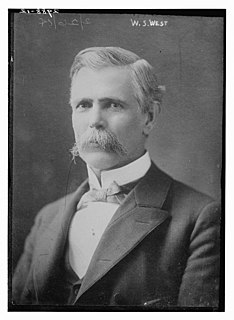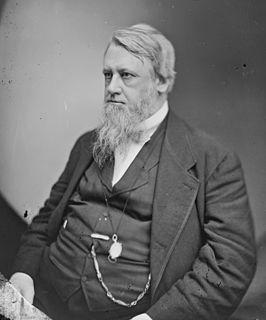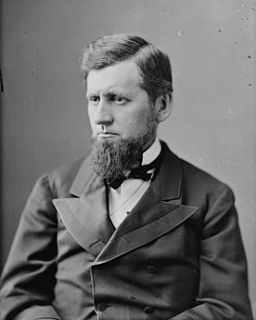
The Seventeenth Amendment to the United States Constitution established the direct election of United States senators in each state. The amendment supersedes Article I, §3, Clauses 1 and 2 of the Constitution, under which senators were elected by state legislatures. It also alters the procedure for filling vacancies in the Senate, allowing for state legislatures to permit their governors to make temporary appointments until a special election can be held.

Augustus Octavius Bacon was a U.S. politician. He served as a Democratic Party U.S. Senator from Georgia, and rose to the position of president pro tempore of the United States Senate. Controversy arose during the American Civil Rights Movement over a provision in his will that created a racially segregated park in his hometown of Macon, which led to two U.S. Supreme Court decisions.

The United States Senate elections of 1914, with the ratification of the 17th Amendment in 1913, were the first time that all seats up for election were popularly elected instead of chosen by their state legislatures. These elections occurred in the middle of Democratic President Woodrow Wilson's first term.

The 62nd United States Congress was a meeting of the legislative branch of the United States federal government, composed of the United States Senate and the United States House of Representatives. It met in Washington, DC from March 4, 1911, to March 4, 1913, during the third and fourth years of William H. Taft's presidency.

Maurice Connolly was elected in 1912 to a single term as a Democratic member of the U.S. House of Representatives from Iowa's 3rd congressional district. After giving up his House seat in an unsuccessful bid for election to the U.S. Senate in 1914, Connolly then served as an aviation officer in World War I and died in a plane crash in 1921.

In the United States Senate elections of 1912 and 1913, Democrats gained control of the Senate from the Republicans. Of the 22 seats up for election, 17 were won by Democrats, thereby gaining 4 seats from the Republicans. Two seats were unfilled by state legislators who failed to elect a new senator on time. They were the last Senate elections held before ratification of the 17th Amendment, which established direct elections for all seats in the Senate.

William Stanley West was a United States Senator from the state of Georgia. He was a Democrat. He is notable for being the first person appointed to the Senate after ratification of the Seventeenth Amendment made that possible.

Although the 17th Amendment was not passed until 1913, some states elected their senators directly before its passage. Oregon pioneered direct election and experimented with different measures over several years until it succeeded in 1907. Soon after, Nebraska followed suit and laid the foundation for other states to adopt measures reflecting the people's will. By 1912, as many as 29 states elected senators either as nominees of their party's primary or in conjunction with a general election.

The United States Senate elections of 1908 and 1909 were held to determine the winners of the 31 class 3 Senate seats up for election, as well as various special elections to fill vacancies or confirm appointments. Until the 17th Amendment, which passed in 1913, Senators were elected by state legislatures. However, some states had already begun direct elections during this time. Oregon pioneered direct election and experimented with different measures over several years until it succeeded in 1907. Soon after, Nebraska followed suit and laid the foundation for other states to adopt measures reflecting the people's will. By 1912, as many as 29 states elected senators either as nominees of their party's primary or in conjunction with a general election. The Republicans lost two seats overall.
The United States Senate elections of 1856 and 1857 were elections which had the young Republican Party assume its position as one of the United States's two main political parties. The Whigs and Free Soilers were gone by the time the next Congress began.

In the United States Senate elections of 1870 and 1871, the Republican Party lost five seats in the United States Senate, though it still retained an overwhelming majority. In advance of these elections, the last four seceded states were readmitted to the Senate.

The United States Senate elections of 1900 and 1901 were elections in which the Democratic Party gained two seats in the United States Senate, and which corresponded with President William McKinley's landslide re-election. By the beginning of the next Congress, however, the Republicans gained five additional seats, giving them a ten-seat majority.

The United States Senate elections of 1906 and 1907 were elections which had the Republican Party gain three seats in the United States Senate, expanding their majority to more twice that of the opposing Democratic Party.

The 1912 United States Senate elections in Arizona took place on December 12, 1911. The Arizona State Legislature confirmed the selection of Marcus A. Smith and Henry F. Ashurst as the state's first U.S. Senators on March 27, 1912. This marked the first U.S. Senate elections held in the state after it was admitted to the union as the 48th state on February 14, 1912. The two men were sworn in on April 2, 1912.

A Special Election to the United States Senate was held in Maryland on November 4, 1913 to fill the vacancy caused by the death of Sen. Isidor Rayner. The election was the second Senate election held under the Seventeenth Amendment to the United States Constitution, which required direct election of senators, but it was the first in which the election was contested by multiple parties.

Two United States Senate elections were held in Illinois on March 26, 1913. The two elections were interconnected through a compromise made to elect a Democrat in the regular election and a Republican in the special election.














